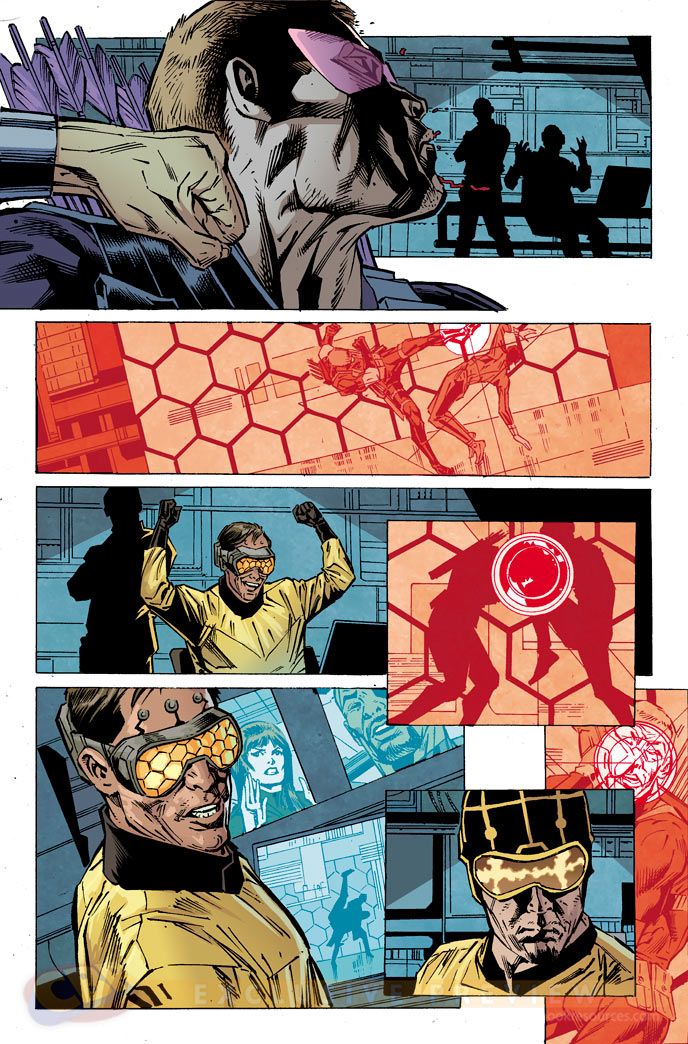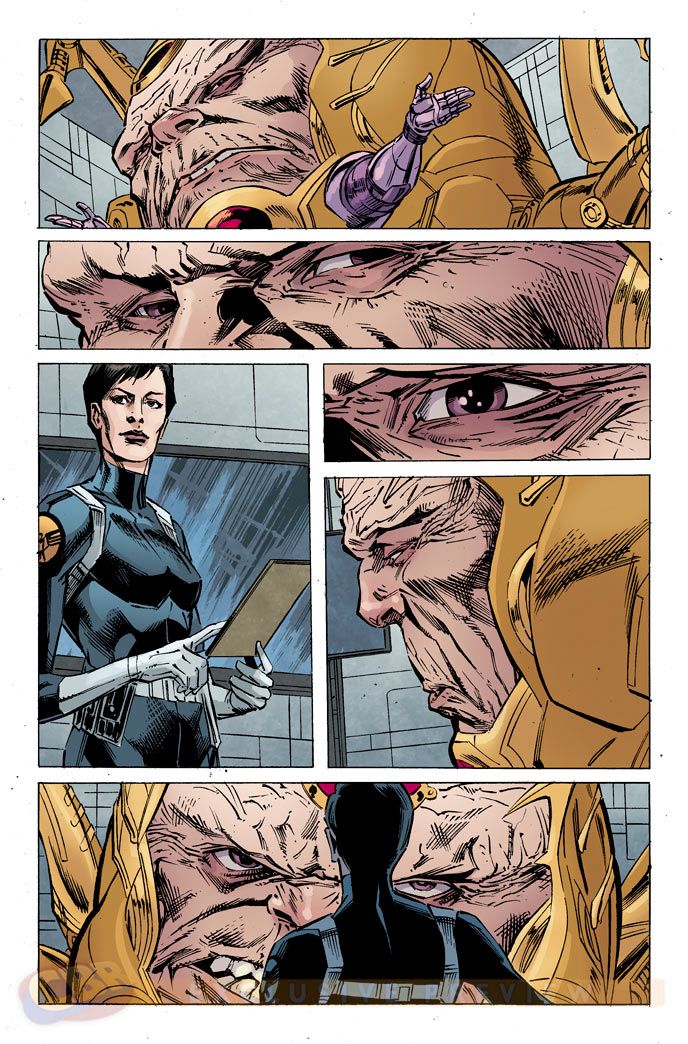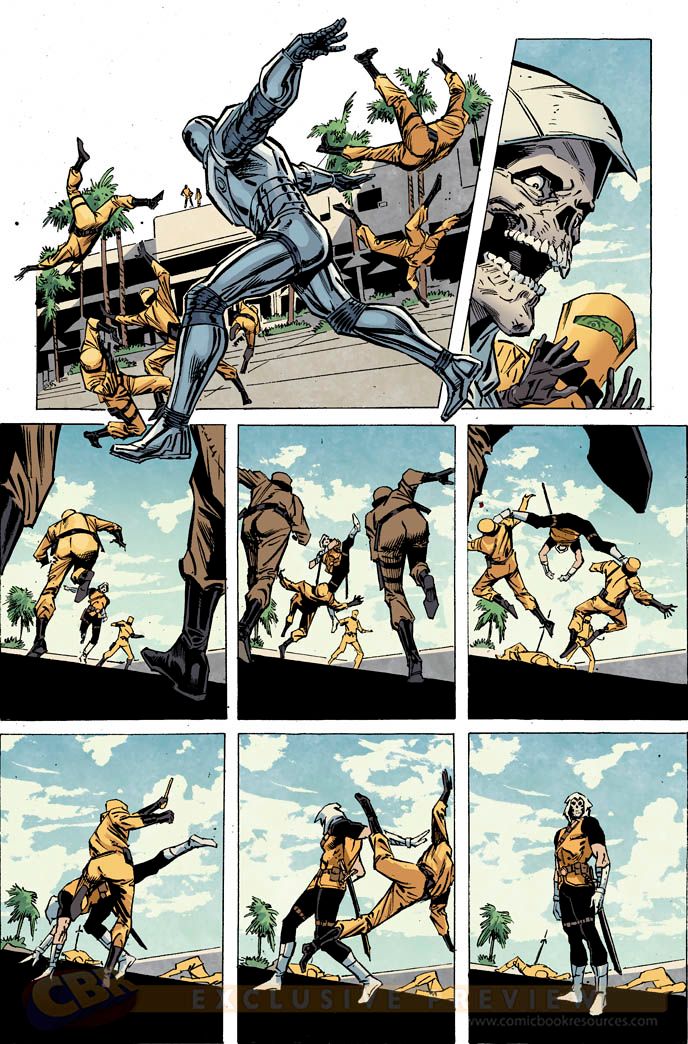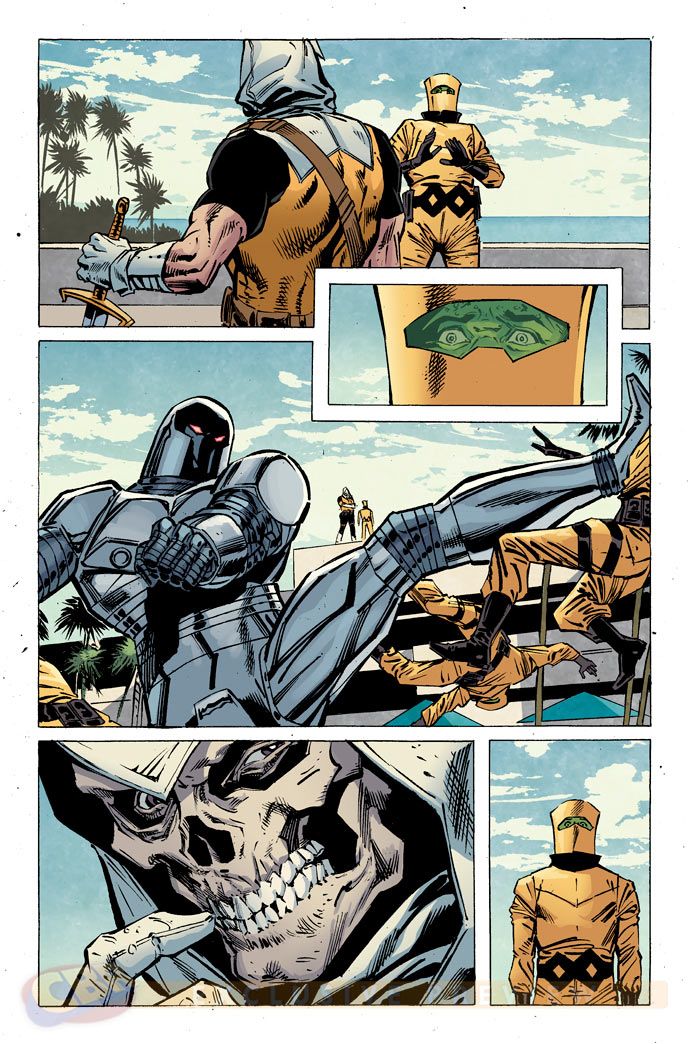Since the launch of its most recent volume, Marvel Comics' "Secret Avengers" has trafficked in equal parts brainwashing manipulation and bomb-blowing action. With its latest story, those themes combine to make a fuse lit by newly-minted lead writer Ales Kot, who takes the captain's chair from Nick Spencer.
Last week, "Secret Avengers" #12 started the series' final arc before March's All-New Marvel NOW! relaunch with "How to MA.I.M. a Mockingbird" -- a story which brings to a close the team's battle with A.I.M., a fight that has been building since issue #1, by exposing Mockingbird, Hawkeye, Black Widow and more of the team just as the super science organization is getting desperate. Meanwhile, embattled S.H.I.E.L.D. Director Mariah Hill opened negotiations with former A.I.M. heavy M.O.D.O.K., adding an all-new wrinkle to the story and bringing the giant-headed villain back to a position of prominence in the Marvel U.
CBR News spoke with Kot about the story, and the writer dove into the major themes and moments that will reverberate through the "Mockingbird" arc and into his incoming relaunch with Michael Walsh. Kot discussed what personal ethical questions he'll explore in the book and the unseen past of M.O.D.O.K. even as he prepares to kill several characters.
CBR News: The last big arc of this run of "Secret Avengers" feels like the culmination of the series in a lot of ways. Of course, that's less a matter of a long-fought battle paying off and more one of the shit hitting the fan in a major way. What are your goals in terms of making this "rock and a hard place" story the capper to what Nick Spencer started in Marvel NOW!?
Ales Kot: "How to MA.I.M. a Mockingbird" is most definitely a conclusion of the current iteration of "Secret Avengers." The way I feel about it right now is sort of like, what if "Empire Strikes Back," which is the Star Wars movie I come back to the most, was the last part of the original trilogy?
I can see the readers shaking from over here, standing on top of some Czech mountain above all the woods, seeing all the way to the United States.
My goals -- well, the ones I can tell you about that won't spoil anything, at least, are:
Deliver a fitting conclusion to Nick's exploration of the grey, ethically ambiguous, twist-filled spheres of the Marvel Universe. Create a story I would happily read and enjoy, a story I would come back to, a story that would surprise me. As always, I keep my focus on listening to everyone in the story. For me, it's less about thinking about "characters" and more about perceiving them as full-on people with all the dynamism that comes from not reducing fictional characters only to the pieces that neatly fit into preconceived structure/narrative. Have a lot of fun making this. Create a dynamic collaboration with everyone involved, from editors (Lauren Sankovitch, Jon Moisan, Tom Brevoort) to artists (Butch Guice and Luke Ross) and our esteemed colorist, Matt Wilson. Add emotions, thoughts, ideas that engage me. Mix it all up and give it to you, hoping you will love what we serve.
At its core, the arc focuses on Bobbi Morse and her predicament as a discovered undercover agent with no solid memory of who she is or what her mission was. This is only the most recent time Mockingbird has been thrown into a terrible circumstance, thanks to her association with S.H.I.E.L.D. and the Avengers. What do you connect to in her as a character, and how does this story serve as a platform for what you view as her strengths?
Well, I connect to Bobbi as a human being. While I do make a distinction between fiction and reality when it comes to being fully in charge of my own choices -- external circumstances don't "make me" do a thing, the choice is always mine -- I don't see the fiction/reality veil applying as much when it comes to communicating with the beings inside stories I am writing. I am still figuring this out, of course -- if I am co-creating a world, and take the beings in it as my equals, why would I make them suffer? This is one of the big questions and I am certainly searching for whatever the answer(s) is/are.
Back to Bobbi, I simply connect with her as a being that contains everything, same as every single one of us. I like that she chooses to be upbeat, even when the external circumstances are very trying. I like her professionalism. I like that she doesn't run away when faced with a problem -- unless she realizes running away is the right choice, which it sometimes maybe is. I like that she's got background in science. I like that she challenges her fears. I can go on.
How does this story serve as a platform for what I view as her strengths? Keep on reading.
Of course, Mockingbird isn't the only person getting "made" in the story. Taskmaster seems poised to blow his cover, and the Hawkeye/Fury/Widow team just got caught by former Black Widow Yelena Belova and the mysteriously returned Shang Chi. Is this story generally about the break down of the Secret Avengers way of doing business? What does it mean for the team in general to be brought into the light of day and for these characters in particular?
What you're essentially asking me to do here is to spoil the story going forward. I don't want to do that. I want the readers to discover it on their own. I will give hints.
One: the story is about systems breaking down. At the same time, when systems break down, new systems emerge. Sometimes old, hidden systems come to light as well.
Two: we live in a world where squads hidden from public sight, often belonging to governments, operate seemingly above the law -- kidnappings, extrajudicial killings and other things happen and vanish nearly without a trace. What does engaging in these kinds of operations do, short-term and long-term, to people involved? And what does happen to people who are affected by proxy?I am looking at real-life documents like "Dirty Wars" and "The Act of Killing" for inspiration. At the same time, the Marvel characters have their own codes of ethics, which are sometimes not in agreement with participating in secret operations -- so seeing these worlds interact and influence each other is something I am very interested in exploring.
These are hints that are not only valid for this storyline, but also for the new relaunch, written by me and drawn by Michael Walsh, the first issue of which comes out in March 2014.
The other big element of this arc is the full-on return of M.O.D.O.K. as a force vying for total control of A.I.M. As much love as folks have for that character, I get the feeling that much of the affection comes from a sarcastic "Look at the giant head!" place. What do you and Butch Guice & Luke Ross have to do to keep a villain like this a viable threat in this series?
Oh, I just listen to what M.O.D.O.K. says. He's in full-on Heisenberg mode. M.O.D.O.K. is a master manipulator, or at least that's the way he loves to see himself -- a facilitator, a businessman, a man whose starting point is science terror and his destination is domination. Now, when someone like that comes around, greedy for power and eager to use people -- I usually ask myself, what happened to them in the past? Why are they like this?
See? You're interested now.
Like I said, M.O.D.O.K. is seemingly making a move to legitimize A.I.M. as a means to wrestle back control of it. The high science espionage organization hasn't always had a clear definition in the Marvel U outside "the beekeeper guys." By this story's end, what do you hope to do in terms of defining A.I.M.'s place in the universe? In the high stakes world of superheroing, what does cutthroat science best represent?
A.I.M. is growing and diversifying. By the end of this story -- nope. Read it. And who knows? Maybe "Avengers World" will have a thing or two to say about A.I.M.'s place as well. The way I see A.I.M. -- this much I feel comfortable saying -- it's one of the most dangerous organizations in the Marvel Universe, and the people within it are interested in growth scenarios.
Cutthroat science in the hands of A.I.M. represents misuse of scientific discovery for personal gain. It represents worship of greed and a cultish/religious (let's not confuse those with "spiritual"), dogmatic approach to the world.
One major aspect of this whole series -- from the mindwiping setup on through to the battle for A.I.M. and beyond -- has been control. And like I said at the beginning, any sense of control for the cast, from Maria Hill on down, seems to be rapidly deteriorating. What does that say about the nature of power in this world? What does it take to hold it, and is its pursuit worth the price paid?
I believe that balance in my life can only be achieved if I respect and work with both order and chaos. Nassim Nicholas Taleb wrote about Black Swans -- events that are so unexpected that there is no easy way of preparing for them. The way I live, I choose to see every situation as a potential positive thing. The only being I have continuous power over in this world -- because we're not talking role-play scenarios here -- is my own self. So instead of attempting to change the world, I usually focus on changing myself, because when I change myself, the world/universe responds to that change by changing itself as well. It's all waves, it's all music -- change one piano key or one second of a bass line and you get an entirely different track, because the overall harmony changes.
As for the sorts of power games where one tries to swerve other people to further their own goals in a manner that is not honest or otherwise not ethical -- I have no time for it in my life decisions. Exploring it in fiction is often tremendously exhilarating. I do my best to be continuously aware of my own shadow, in the Jungian sense of a shadow, and that means dealing with dark, bleak things that sometime come up from inside of me. The beauty is, I can get them into [my Image series] "Zero" and "Secret Avengers," explore them, see why they don't work, remind myself why they don't work, and do something creative instead. And if I'm overloaded, I go boxing. Or run. Or swim. Or meditate. And such.
So -- the nature of power in this world: I believe there is real power, the one we have over ourselves, each one over our own self. I believe change comes from that power, from the power of our own, individual belief, and from our willingness to follow it however seemingly unrealizable it might seem.
I also believe there is such a thing as illusory power, a parasite meme that uses us, a belief that some people are less and others are more, a belief that we need to be led by strong people because we can't govern ourselves, a belief that says this is a dog-eat-dog society. And it's not. We're only taught it is. And we are responsible for the stories we tell. Each one of us is responsible for our own story, and also for the stories we put into the world.
And all of this is something the Secret Avengers stories are -- and will be -- dealing with.
Speaking of control, we still haven't seen where, exactly, Daisy and the Winter Soldier will show up again in this series. I can't imagine that they won't have some impact on the endgame of this long story, right?
You'll see. Once we get to that diner full of Nazis.
The next volume of "Secret Avengers" is just around the corner. And since it seems like the makeup of that team isn't 100% the same as this one, I'm betting that has some fans nervous about who makes it out of this volume alive -- particularly with how this final arc's title focuses on one of the team's "non movie star" members. Is there a piper to be paid in order to get us to the next phase of "Secret Avengers"?
There will be deaths. Plural.
I am not sorry.
"Secret Avengers" #12 is on sale now from Marvel Comics.





